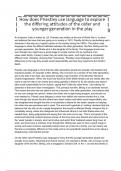An Inspector Calls is written by J.B. Priestley was written at the end of World War II, to show
and address the issue that was going on in society in 1912. Priestly did this by symbolising each
character in the play as a 'regular' person in the society during the 1900's. The author uses
language to show the different attitudes between the older generation, like Mrs. Birling and the
younger generation, like Sheila who is the daughter of the family. The language shows how
even though they might have a good image in society and be rich as members of an
upper-class family, it doesn’t mean they are what they seem, and might have a completely
different inner character, showing their 'real-selves.' Priestley uses language to explore the
differences in the way they accept social responsibility and how they respond to Eva Smith’s
death.
Priestly uses language to show that the older generation people are actually cold-hearted and
impulsive people. An example is Mrs. Birling, who is known as a woman of the older generation,
and is the wife of two kids, also being the wealthy, head member of the Brumley Women's
Charity Organisation. When she found out that Eva Smith killed herself, just two weeks after she
came to ask for help in her charity [now being partially to blame for it], she denies and doesn't
take social responsibility for her actions, saying that 'Unlike the other three, I did nothing I'm
ashamed of that won't bear investigation.' This portrays that Mrs. Birling is an obstinate woman.
This means that she has one opinion and as a woman in the older generation, she believes that
no one can change her opinion, where she thinks she is right being arrogant, and should not
even attempt to. Priestly uses dialogue to show how selfish and narrow-minded she is, that
even though she knows that the others have been mature and taken social responsibility, she
has disagreed and thought that she is not partially to blame for her death, despite not helping
her when she was penniless and in need. The word and hyperbole in ‘nothing’ declares that she
believes that she did not do a single thing/action that would’ve affected Sheila. However this is
completely wrong, where she disagreed and influenced others to not help Sheila when she
needed them, being judgmental and saying that ‘she had a lot to say.’ This is not typical of the
social and historical context because women at the time were very tolerant and were known as
the ‘weak’ people in society, who had to allow and watch their husbands spend long hours at
work, and even have a mistress. Even though Mrs. Birling was seen to have a good image in
society and looks innocent, especially being known as a head of a charity, you can clearly see
that she is completely different on this inside and is not sympathetic towards Eva at all, being a
disapproving, cold-hearted woman.
On the other hand Priestley uses language to show that the younger generation people are
actually more aware, influential and mature women. An example is Sheila, who is known as the
daughter of Mr and Mrs. Birling, and is engaged to Gerald Croft. In Act 1, we see that Sheila is




